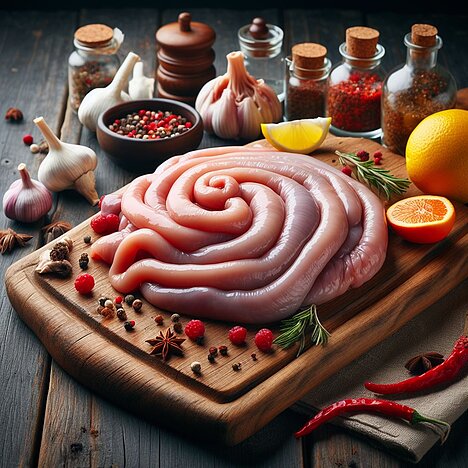Turkey gizzard

What are turkey gizzards?
Turkey gizzards are the organs that help the turkey to digest its food. They consist of muscle and cartilage and have a tough consistency. Turkey gizzards are part of the giblets, which can also include the liver, heart, kidneys and neck.
Are turkey gizzards good for dogs?
Yes, turkey gizzards are good for dogs. They are rich in protein, iron, zinc and other nutrients that are important for your dog's health. They are also a natural source of taurine, an amino acid that is important for your dog's heart function and vision.
Turkey gizzards can be fed as a snack or as part of a balanced diet. They can be fed raw or cooked, depending on what your dog prefers. If you feed them raw, make sure they come from a trustworthy source and that you wash them thoroughly to avoid bacteria. If you cook them, simply boil them in water without adding salt or spices.
Are there any disadvantages to turkey gizzards?
Turkey gizzards are generally safe for dogs, but there are some things you should be aware of. For one, they contain a lot of cholesterol, which is not ideal for dogs with heart problems or who are overweight. Therefore, limit the amount of turkey gizzards you feed your dog to no more than 20 percent of his diet.
Secondly, turkey gizzards can be very hard and a challenge for your dog's teeth. If your dog has sensitive teeth or is prone to dental problems, it is better to give him softer chews or to chop or cook the turkey gizzards beforehand.
Turkey gizzards are a tasty and nutritious snack for your dog. They offer many benefits for his health and well-being. However, make sure that you feed them in moderation and that you prepare them correctly to avoid potential problems.
If you notice any signs of hypersensitivity or poisoning in your dog, you should see your vet immediately. We are not a substitute for a vet, but we try to be as accurate as possible. Every dog reacts differently and we recommend you get a second opinion or consult your vet if in doubt.
Stay healthy and take good care of your four-legged friend!😊